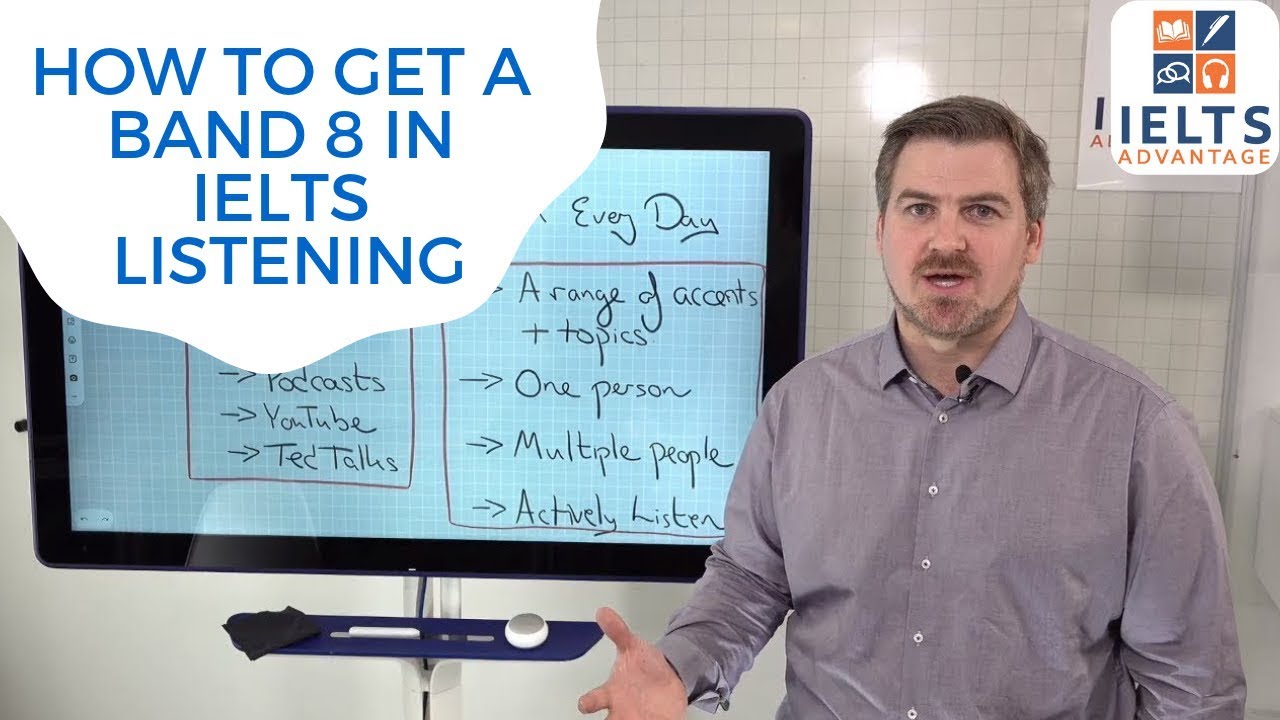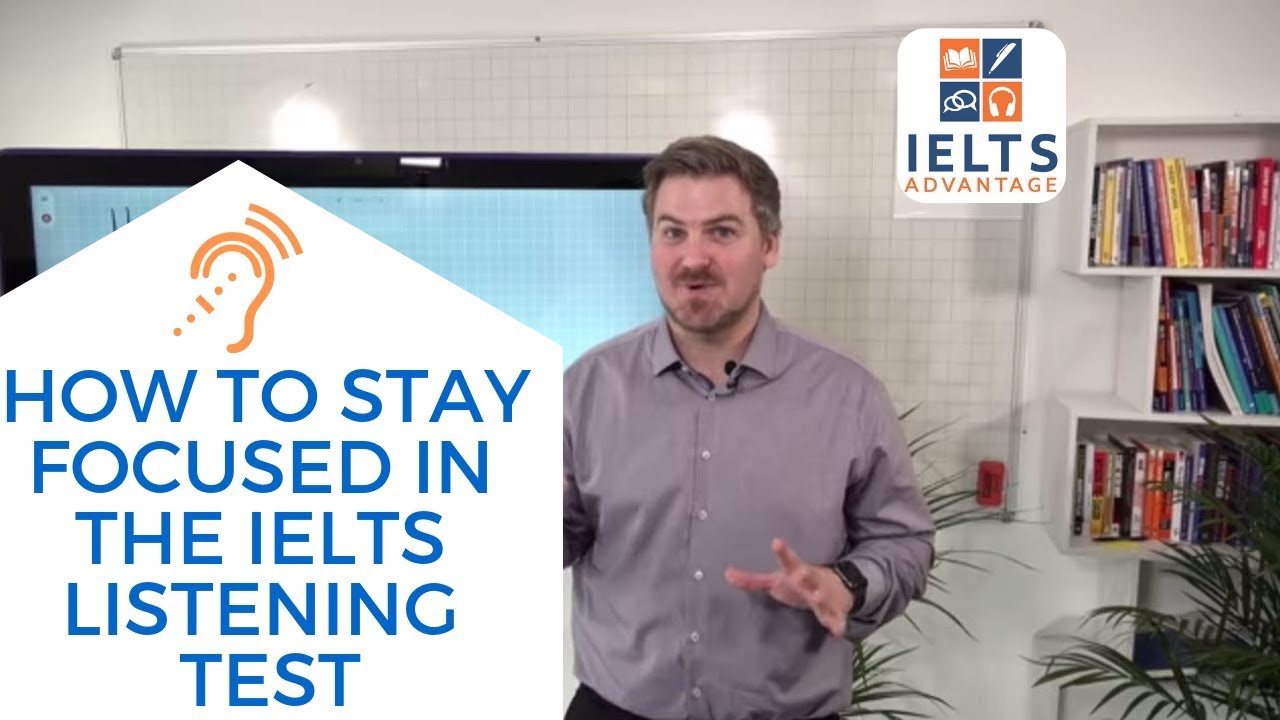How Do I Get a Band 9 in IELTS Listening?
Summary
TLDRIn this IELTS Advantage video, Chris addresses how to achieve a high score in the IELTS listening test, emphasizing that relying solely on strategies and practice tests is insufficient. He highlights the importance of developing listening skills, vocabulary, and focus, especially on understanding connected speech and guessing word meanings from context. Chris introduces 'micro-listening,' a technique where learners listen to native English content they enjoy and repeatedly pause to write down sentences until fully understood. This method aims to improve listening comprehension and vocabulary retention simultaneously.
Takeaways
- 📘 The IELTS listening test is divided into four parts with increasing difficulty, making parts three and four the most challenging.
- 🎯 Students aiming for a band eight or nine often struggle with parts three and four due to the complexity of the language used.
- 🚫 Relying solely on strategies and doing lots of listening tests is ineffective for achieving a high band score.
- 👂 The three key areas to focus on for improving scores are listening skills, vocabulary, and the ability to focus, especially on multiple speakers.
- 🗣️ Understanding connected speech is crucial for success in parts three and four of the listening test.
- 🤔 The ability to guess the meaning of words from context is an essential skill for IELTS listening.
- 🎵 Listening to real English, such as native speakers conversing naturally, is more beneficial than listening to English learning content.
- 🔍 Micro-listening involves stopping and re-listening to parts of audio until fully understood, which helps improve listening skills and vocabulary.
- 📝 Writing out sentences as you understand them from the audio is a key part of the micro-listening technique.
- 📒 Keeping a vocabulary notebook to record new words and reviewing them regularly is advised for long-term retention.
- 🎯 The speaker emphasizes that consistent practice with enjoyable materials is more effective than quick tips for achieving a high IELTS band score.
Q & A
What is the main difficulty students face in achieving a high band score in the IELTS listening test?
-Students typically struggle with parts three and four of the listening test, which are the most difficult sections, often due to the natural and connected speech patterns used by native speakers.
Why do strategies and listening tests alone not help students achieve a band eight or nine?
-Strategies and listening tests are not sufficient because they do not address the core issues of listening skills, vocabulary, and focus, which are essential for understanding more complex parts of the test.
What are the three key elements that can help students improve their IELTS listening scores for parts three and four?
-The three key elements are listening skills, vocabulary, and the ability to focus, especially on multiple speakers at the same time.
Why is understanding connected speech crucial for the IELTS listening test?
-Connected speech is how native English speakers communicate naturally, and the test assesses the ability to understand real English. Without this skill, students will struggle to comprehend questions, even if they have good strategies.
How does the speaker suggest students improve their vocabulary for the IELTS listening test?
-The speaker suggests that students improve their vocabulary by guessing the meaning of words from context while listening, and then reviewing and adding new vocabulary to a notebook for retention.
What is the technique called that the speaker recommends for improving listening skills, vocabulary, and focus?
-The technique recommended is called 'micro listening,' which involves intensively listening to and analyzing short segments of speech until fully understood.
Why does the speaker suggest avoiding English learning YouTube videos for improving IELTS listening skills?
-The speaker suggests avoiding these because they often do not present real English and can make students' English worse by not exposing them to natural speech patterns and vocabulary.
What is the role of context in guessing the meaning of unfamiliar words during the IELTS listening test?
-Context plays a vital role as it allows students to infer the meaning of words from the surrounding text, title, or general topic of the conversation, which is a skill necessary for parts three and four of the test.
How often should students practice micro listening according to the speaker?
-Students should practice micro listening daily or at least three to four times a week over weeks and months to see improvement.
What is the importance of reviewing new vocabulary after learning it through micro listening?
-Reviewing new vocabulary is important to reinforce memory and ensure long-term retention, which can be done through various methods such as using the words in example sentences.
What is the speaker's stance on quick tips for achieving a high band score in the IELTS listening test?
-The speaker is skeptical of quick tips, stating that they do not work and that anyone promising a quick fix to achieve a high band score is likely not a real IELTS teacher.
Outlines

Dieser Bereich ist nur für Premium-Benutzer verfügbar. Bitte führen Sie ein Upgrade durch, um auf diesen Abschnitt zuzugreifen.
Upgrade durchführenMindmap

Dieser Bereich ist nur für Premium-Benutzer verfügbar. Bitte führen Sie ein Upgrade durch, um auf diesen Abschnitt zuzugreifen.
Upgrade durchführenKeywords

Dieser Bereich ist nur für Premium-Benutzer verfügbar. Bitte führen Sie ein Upgrade durch, um auf diesen Abschnitt zuzugreifen.
Upgrade durchführenHighlights

Dieser Bereich ist nur für Premium-Benutzer verfügbar. Bitte führen Sie ein Upgrade durch, um auf diesen Abschnitt zuzugreifen.
Upgrade durchführenTranscripts

Dieser Bereich ist nur für Premium-Benutzer verfügbar. Bitte führen Sie ein Upgrade durch, um auf diesen Abschnitt zuzugreifen.
Upgrade durchführenWeitere ähnliche Videos ansehen
5.0 / 5 (0 votes)






